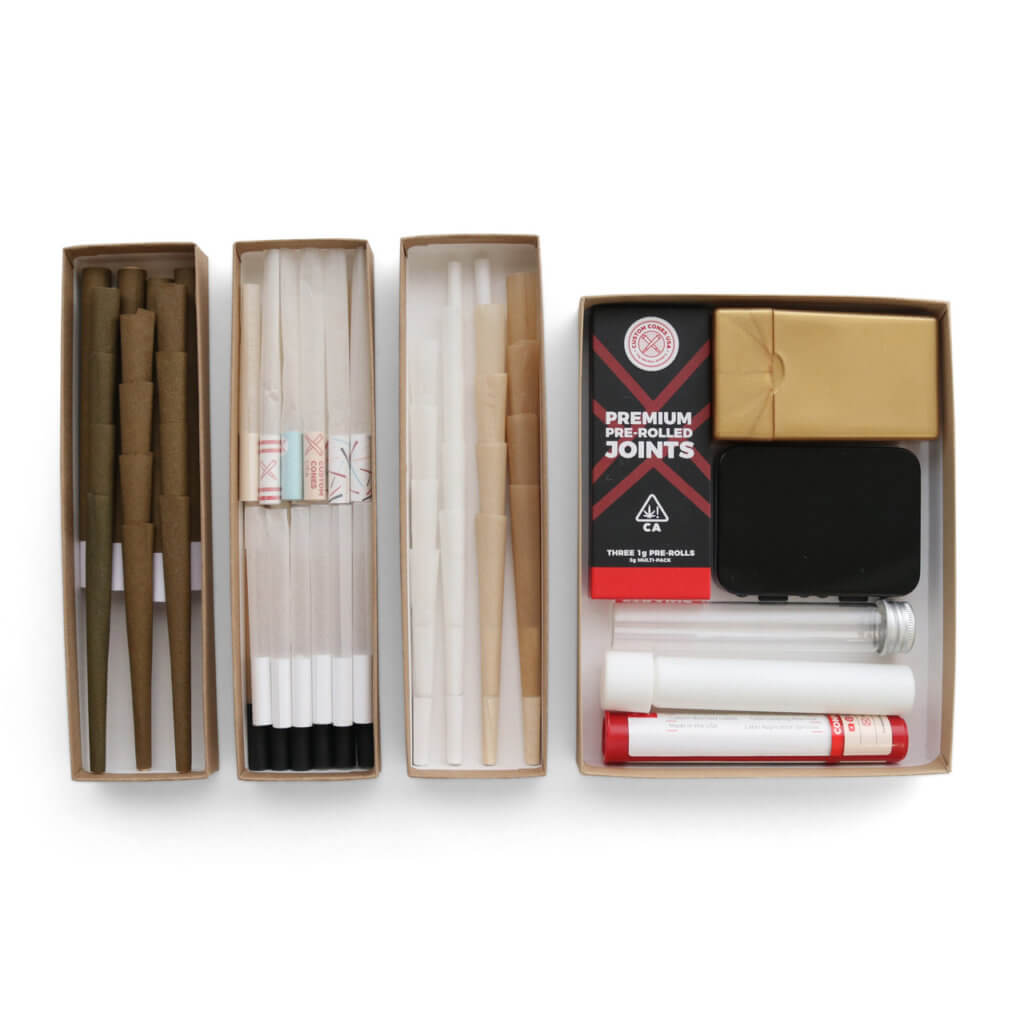Member Blog: Ensuring Pre-Roll Compliance – Navigating New York’s Stringent Cannabis Testing Regulations

With several states going legal ahead of them, New York State regulators had the benefit of watching other states develop testing programs, which is why New York’s testing regiment goes beyond many of the early adopter states to be one of the most stringent in the nation.
And while the rollout of licenses has been slower than many expected, testing regulations are now in place to ensure the products that do make their way to the public are safe for consumption.
New York also requires products be tested in their final form, which means that pre-rolls, for example, will be tested with rolling papers included so it is vitally important that your rolling papers will also pass the following tests to ensure that all cannabis products are safe for human consumption.
New York requires testing for the following:
- Moisture Content and water activity;
- Residual solvents and processing chemicals;
- Eight different heavy metals;
Each of these tests are performed to protect consumers and are performed in some capacity by every state that has a legal cannabis program, though every state has its own regulation.
Some of the testing limits are fairly standard, like for example the limits on moisture content and water activity. Because any water activity above 0.70 Aw creates the conditions for mold to grow, which can be harmful if consumed, New York, like most states, caps water activity at 0.65 Aw in flower and pre-rolls. Additionally, dried flower batches must have a moisture content between 5.0-15.0%, with any sample exceeding 15.0% deemed unacceptable.
However there are some significant differences between the Empire State’s regulations and those in other markets.
Heavy Metals Testing
One of the major differences between New York and other programs is the number of heavy metals for which it tests. Plants absorb heavy metals from the soil, but they can damage all the body’s vital systems, including respiratory, central nervous and even the reproductive system.
While New York tests for the “Big Four” – mercury, cadmium, lead and arsenic (all of which are toxic even at small doses) – it is also one of a handful of states that also add chromium, which can damage the kidneys and liver.
But the Empire State goes even a step farther, requiring additional testing for copper, nickel and antimony.
Microbial and mycotoxin testing
Microbes and mycotoxins represent the greatest threat to human health among the tested items.
Most people are familiar with how microbes can make you sick, which is why New York tests for Salmonella, E. coli and several Aspergillus species of mold, including A. fumigatus, A. flabus, A. niger and A. terreus.
Mycotoxins are a toxic compound produced by molds like Aspergillus and can suppress the immune system and cause liver damage. New York requires testing for two classes of mycotoxins: Aflatoxins and Ochratoxin A. Both have properties that can alter DNA and potentially cause the formation of cancer cells. Testing for mycotoxins help ensure cannabis products are safe for human consumption.
The limit for all mycotoxins in New York is 0.02 micrograms per gram.
Pesticides
Like most states, New York limits the pesticides that cannabis growers may use to help boost production and prevent insects from destroying their crop and requires labs to test for residual pesticides on product.
All pesticide products sold in New York State must be registered with the state, unless classified as a “minimum risk pesticide” by the federal government. To help producers determine if a pesticide can be used on cannabis, the state’s Department of Environmental Conservation even added “cannabis” and “hemp” to the use/type drop down menu in its pesticide database.
All pesticide use “must be declared for targeted testing” and additionally, New York law also requires labs to specifically test for 70 different pesticides, providing actionable limits.
Ensuring New York Pre Roll Compliance
As we noted, New York law requires all products be tested in their final form, including pre-rolls. According to the law, “the entire pre-roll or a portion of it (depending on size (blunt, 0.5-g, 1-g)) must be prepped and tested for all contaminants of concern,” which means even if your cannabis is clean, your products can fail and be destroyed if your rolling papers or pre rolled cones are not.
Because of that, manufacturers need to protect themselves – and their customers – by carefully selecting suppliers. After all, a study from California’s SC labs found that 11% of rolling papers they tested would fail that state’s testing regiment – which doesn’t even include Chromium, copper, nickel or antimony – and that 90% of rolling papers contained heavy metals with more than 8% containing them at a rate above the allowable limits.
Also, this year in Michigan, researchers analyzed the elemental composition of 53 different rolling papers and discovered that about 25% of the samples contained copper at levels that exceed recommendations for inhalable pharmaceuticals. They also found elevated levels of copper, chromium and vanadium.
Pre-roll manufacturers in particular need to pay attention to their suppliers and make sure that the company from which they buy their paper takes testing as seriously as they do. This is especially true for blunt products, which contain more moisture and biomass in the hemp wraps, which makes these products more susceptible to fail these compliance tests.
Custom Cones USA’s Compliance Manager André Bayard always recommends making sure your pre-roll paper supplier is a partner.
“It’s important to find a supplier that does the due diligence and is willing to work with you so you know ahead of time if your papers will pass lab tests,” he says.
Bayard notes that when contacted by a manufacturer concerned about heavy metals content causing failures, Custom Cones USA sent samples ahead of time so the manufacturer could pack and test a handful of their completed pre-rolls to make sure the products were clean before committing to a full order.
If your pre-roll supplier is not willing to go through that step, it may be a sign that you should find another pre rolled cone supplier.
Testing failures can be expensive and damaging to a brand, so make sure you not only keep up on the latest changes to your state’s regulations, but also work with a reputable pre rolled cone company to get the cleanest, best tested pre rolled cones you can find. And always ask to see COAs. Even if you are just a dispensary selling rolling papers and empty cones for smoking, offering tested papers and pre rolled cones is crucial to protect your brand and offer quality products to your customers.
Join Us for More Exclusive Insights on the Michigan Marketplace
Striving to stay informed about New York’s dynamic cannabis industry? Mark your calendars for our upcoming New York Stakeholder Summit being held in New York, NY on Tuesday, September 24th.
At the New York Stakeholder Summit you’ll be able to dive deep into the latest trends, regulations, and opportunities shaping New York’s cannabis landscape, including hearing directly from John Kagia Hanna, Director of Policy for New York’s Office of Cannabis Management. All industry professionals are invited; NCIA members attend free. Register here to secure your spot.
Navigating Missouri’s Stringent Cannabis Testing Requirements: A Deep Dive

When it comes to cannabis testing requirements, Missouri absolutely lives up to its nickname as the Show Me State, requiring its licensed cannabis businesses to run a wide series of tests to prove the cannabis they are sending to store shelves is safe.
As a relatively new state to join the cannabis industry, with voters approving medical marijuana in 2018 and recreational cannabis in 2022, Missouri has had the benefit of watching several other states develop programs ahead of it and its testing regulations reflect that.
Among the strictest testing regiments in the industry, Missouri’s regulations require all cannabis products produced for the medical or recreational market to be tested in its final form, including pre-rolls. That means not only is the flower subject to testing, but your paper and any other ingredients as well, since anything can cause a failure that can see the whole product lot destroyed.
In Missouri, both flower and pre-rolls, for example, must be tested by one of 10 state certified labs for:
- Moisture Content and water activity;
- Residual solvents and processing chemicals;
- Residual pesticides;
- Microbial impurities;
- Mycotoxins;
- Foreign materials;
- The “big four” heavy metals (arsenic, cadmium, lead and mercury) + Chromium;
- Cannabinoids; and
- Terpenes (if requested).
The majority of these tests are designed to protect consumers from potential dangers hidden in their cannabis products, so it is important that any rolling paper or pre rolled cones you buy – even for personal use – should pass these tests.
For example, moisture content and water activity can point to the potential for mold growth. Any water activity above 0.70 Aw creates the conditions for mold to grow, which can be harmful if consumed, which is why Missouri, like many states, caps water activity at 0.65 Aw in flower and pre-rolls.
THE BIG FOUR HEAVY METALS PLUS CHROMIUM
Like many states, Missouri requires testing for the “big four” heavy metals mercury, cadmium, lead, and arsenic, which are toxic to humans, even at small doses. Heavy metals are absorbed into the plant from the soil and can damage all the body’s vital systems, including respiratory, central nervous and even the reproductive system.
Missouri, however, is one of a handful of states that also include chromium in their testing regiment, another dangerous heavy metal. Once chromium reaches the bloodstream, chromium can damage the kidneys, liver, and blood cells with the potential for renal and liver failure if untreated. So, you can see why states have begun adding it to their testing requirements.
MICROBIALS AND MYCOTOXINS
While heavy metals are dangerous, microbials and mycotoxins pose the greatest risk to human health.
Mycotoxins are a toxic compound produced by molds, such as Aspergillus, and can suppress the immune system and cause liver damage. Missouri requires testing for two classes of mycotoxins, Aflatoxins and Ochratoxin A. Both have properties that can alter DNA and potentially cause the formation of cancer cells. Testing for mycotoxins help ensure cannabis products are safe for human consumption.
Missouri regulations require a total mycotoxin concentration of less than 20 micrograms per kilogram for cannabis to receive a passing mark.
Missouri also requires testing for other microbials like Pathogenic E. Coli, Salmonella and Pathogenic Aspergillus Species including A. fumigatus, A. flabus, A. niger and A. terreus.
PESTICIDES
Missouri also requires testing for residual pesticides and other chemicals. The state allows some pesticides to be used on cannabis – tracked by the Missouri Department of Agriculture’s Pesticide Program – but cultivators are required to report in the state track and trace system all pesticides, fertilizers and other chemicals applied to the plants, as well as all the ingredients contained in each of those.
State law requires tests for 61 chemicals and 20 residual solvents, with actionable limits, and foreign matter screening.
LABELING LAWS
Missouri also has a very strict labeling law for its cannabis packaging that requires specific information in a specific order, beginning with the state’s diamond THC logo, the letter “M,” all ingredients, license number of the producer and where the products passed their testing, as well as the track-and-trace number for the samples and the THC potency, among others.
LAB LICENSING AND LAB SHOPPING
Aside from specifics for testing, the Show Me State goes even further when it comes to which labs can be used and how those labs get licensed.
Missouri law contains provisions for exactly who at the labs can conduct the tests, requiring the labs to be employ a laboratory director with a degree in a natural science and at least five years’ experience in a regulated lab environment or a degree in “another applicable field” with 10 years’ experience. It also requires the person performing the test to have a bachelor’s degree in natural science and at least two years of lab experience.
But recent updates to Missouri’s regulations go even a step further than most states in an attempt to stop the process known as “lab shopping” to get desired results. Normally aimed at trying to limit THC potency inflation, the new law requires producers and labs to submit their samples to other labs so results can be compared.
For example, the new regulations say that up to 10 times per year, the state will require one lab to pick up samples from another lab and re-perform a test. The state will review all the results to make sure they have similar potency results and to see if one lab is passing samples for pesticide residue while another one is failing it.
According to Custom Cones USA Compliance Manager André Bayard, while the main focus of the new law appears to be THC potency inflation, which, of course, is a major driver of sales for cannabis companies, that too is a safety concern, especially in the medical market or for low-dose patients and consumers.
ENSURING PRE-ROLL COMPLIANCE

As noted, the Missouri law requires all products be tested in their final form, including pre-rolls. That means even if your cannabis is clean, your products can fail and be destroyed if your rolling papers are not.
Because of that, manufacturers need to protect themselves – and their customers – by carefully selecting suppliers. After all, a study from California’s SC labs found that 11% of rolling papers they tested would fail that state’s testing regiment, which doesn’t even include Chromium, and that 90% of rolling papers contained heavy metals with more than 8% containing them at a rate above the allowable limits.
Pre-roll manufacturers in particular need to pay attention to their suppliers and make sure that the company from which they buy their paper takes testing as seriously as they do. Bayard recommends making sure your pre-roll paper supplier is a partner.
“Find a supplier that is willing to work with you and do the due diligence to make sure you know ahead of time whether your paper will pass,” Bayard says.
Bayard notes that when contacted by a manufacturer in Missouri in 2022 about chromium content causing failures, Custom Cones USA sent samples ahead of time so the manufacturer could pack and test a handful of their completed pre-rolls to make sure the products were clean before committing to a full order.
If your pre-roll supplier is not willing to go through that step, it may be a red flag.
Testing failures can be expensive, so make sure you not only keep up on the latest changes to your states regulations, but also work with a Pre-Roll Expert to get the cleanest, best-tested pre rolled cones you can find. And always ask to see COAs.
Engage with Missouri’s Cannabis Community: Join Us at the Summit!
As you navigate through Missouri’s stringent cannabis testing requirements, it’s imperative to stay informed and engaged with the latest developments in the industry. To further your understanding and involvement, consider joining us at the upcoming Missouri Stakeholder Summit, hosted by the National Cannabis Industry Association (NCIA). The Missouri Stakeholder Summit serves as a crucial platform for industry leaders, policymakers, and stakeholders to convene and discuss the pressing issues shaping Missouri’s cannabis landscape. Each event will host a wide range of programming including interactive panel discussions, intimate fireside chats, and live Q&A to provide participants the opportunity to make the Voice of Main Street Cannabis heard by key decision makers.
All industry professionals are invited; NCIA members attend free and have exclusive access to Q&A sessions. From regulatory updates to market insights, this summit offers a comprehensive view of the opportunities and challenges ahead. From regulatory updates to market insights, this summit offers a comprehensive view of the opportunities and challenges ahead.

Ready to elevate your involvement in the cannabis industry? Explore the benefits of NCIA membership and gain access to exclusive resources, networking opportunities, and advocacy initiatives. Join online today or schedule a meeting with our team to learn more about membership and how NCIA can support your professional growth and business success.
Whether you’re a seasoned professional or new to the industry, the summit provides invaluable networking opportunities, expert panels, and discussions tailored to meet your needs. It’s a chance to connect with like-minded individuals, gain strategic knowledge, and contribute to the growth of Missouri’s cannabis market. Don’t miss out on this unique opportunity to be part of the conversation that drives change and innovation in Missouri’s cannabis industry. Register now to secure your spot and take an active role in shaping the future of cannabis in the Show Me State!





Follow NCIA
Newsletter
Facebook
Twitter
LinkedIn
Instagram
News & Resource Topics
–
This Just In
How THCa Vapes Are Changing Consumer
Announcing NCIA’s 2026-2028 Board of Directors